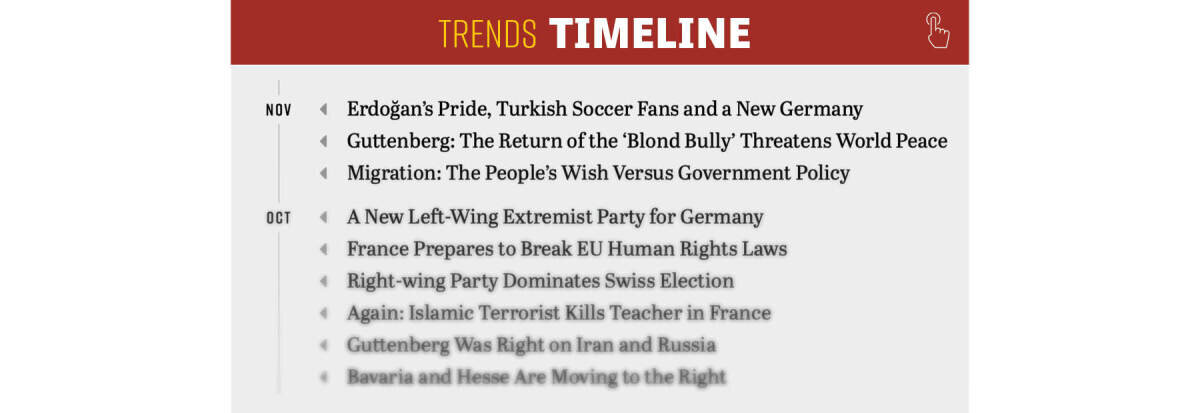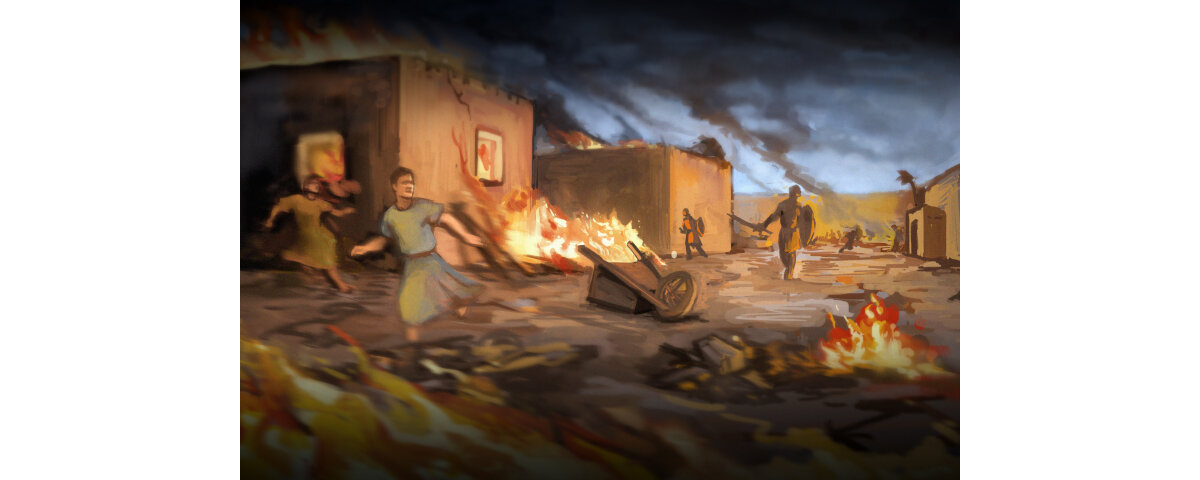THE RISE OF A GERMAN STRONGMAN
Imagine a new 21st-century superpower with more nuclear weapons and a larger economy than China’s, a larger land area than Canada, and more exports than anyone else in the world. Such a power would rival the United States, China and every other world power.
The European Union could be that power. In fact, it has all the components of a global superpower—except one.
The EU is the world’s second-largest economy and the center for global trade. It accounts for 15 percent of the world’s military spending, giving it the world’s second-highest defense budget.
“By most objective measures, [Europe] either rivals or surpasses the United States and China in its ability to project a full spectrum of global military, economic and soft power,” wrote Andrew Moravcsik for Foreign Policy.
Europe has that ability, but it isn’t using it. Why? Because of that one missing component. In fact, instead of exercising its potential as a world superpower, it has been lurching from crisis to crisis. Other powers don’t take the Europeans seriously.
But what if Europe locks in that final, crucial component? What if Europe gets leadership?

EU leadership is a joke. It has between three and five presidents, depending on how you count them, and none of them has real power. Despite the EU’s best efforts, individual nations still retain much of their sovereignty, leaving the Union distinctly disunited.
Europeans themselves see the problem. In 2012, the so-called Berlin Group—a group of 10 of the EU’s core nations—called for an “EU super-president,” formed by merging several of the top jobs. The former chairman of a Campaign for Independent Britain, Lord Stoddart, said, “Such a merger would represent a massive shift of power into the hands of a single, unelected bureaucrat.”

In his September 2017 state of the union speech, European Commission President Jean-Claude Juncker made almost exactly the same proposal. “Europe would be easier to understand if one captain was steering the ship,” he said.
These proposals have gained little ground: European nations are unwilling to give up their power. However, the Continent already has a ready-made leadership post in place. It simply needs the right person to fill it.
Someone once asked, Whom do I call when I want to call Europe? For some time, that answer has been a no-brainer: You call the chancellor of Germany. Germany is the strongest nation in the Union and its de facto leader.
A strong German leader would easily be a strong European leader.
Yet Germany lacks that leader.
On Sept. 24, 2017, German voters showed their frustration with the established political system by abandoning Germany’s mainstream parties in droves. The Social Democrats and two Christian Union parties received only 53.4 percent of the vote. In the history of Germany’s current political system, which was established after World War ii, this is the lowest number of voters ever for these two parties.
German voters vented their frustration with their nation’s leadership and voted instead for fringe parties. This left the mainstream parties with little to no options for the formation of a functioning government.
This turmoil in Germany and in Europe is unfolding in an increasingly dangerous and unstable world. What happens when there is another terrorist attack? Or another Russian offensive? An economic crash? Or some other crisis?
The already great appetite for strong leadership will only grow.
This is exactly what the Trumpet and the Plain Truth magazines have forecast for years.

_____
A Bold Leader’s Bold Forecast
Throughout the 52-year history of the Plain Truth, editor in chief Herbert W. Armstrong and his editorial staff pointed to events that were leading to the inevitable rise of a European federation. Before World War ii, Mr. Armstrong foresaw it. During the heat of the Battle of Britain, he continued to forecast it. And when Germany lay defeated, crushed to smoldering dust by the onslaught of the Allies, he continued to proclaim this future resurrection of a German-led European superpower. Right up to his final sermon, delivered in late 1985, Mr. Armstrong continued to powerfully prophesy of these events.
That federation is now here. It just needs leadership.
The November-December 1954 Plain Truth carried the following bold warning:
In February 1945—just a few months before the end of the war—President [Franklin] Roosevelt and Prime Minister [Winston] Churchill announced the joint American-British policy on Germany. This was the solemn policy and warning for the future. Listen. Quote: “It is our inflexible purpose to destroy German militarism and Nazism and to ensure Germany will never again be able to disturb the peace of the world. We are determined to disarm and disband all German armed forces; break up for all time the German General Staff that has repeatedly contrived the resurgence of German militarism ….” And now, a short nine years later, behold the spectacle of Washington and London making every possible diplomatic effort, backed by American dollars, to do two things: Create a united states of Europe, and to rearm Germany. … Germany inevitably [will] emerge as the leader of a united Europe. It will require some spiritual binding force to inspire this confidence—to remove these fears—and that spiritual binding force must arise from inside Europe! All Europe is actually ready—just waiting for the confidence-inspiring leader …. That man is there somewhere.
In the Good News magazine in May 1953, Mr. Armstrong wrote, “[I]t is probable that none but a German can provide the dynamic, inspired leadership required to organize such a political military federation.”
European nations are becoming “distrustful of America and thinking more and more about uniting themselves into a united states of Europe,” he wrote in March 1950. To do that though, they needed a “new supreme leader—the successor of Adolf Hitler—to rise up and assert himself and take command.”
Even in the final year of his life in 1985, he was writing, “There is yet another leader to arise in Europe!”
Trumpet editor in chief Gerald Flurry continued that same warning the first year the magazine was established—and every year since.
“If a real crisis develops, will the Germans call for a new führer?” he asked in the December 1991 issue. “Your Bible says that is going to happen! That crisis will probably be triggered by an economic collapse in the U.S.”
Mr. Flurry has also talked about how this leader could come to power. In a 2009 Key of David program, he said this leader could “perhaps take advantage of a weak coalition.” That specific forecast is especially interesting in the wake of the September 2017 German federal election that has left the German government weak and fractured politically and could leave the nation without a government for months. This is exactly the kind of environment that the right kind of leader could use to his advantage.
Why would Mr. Flurry and Mr. Armstrong repeatedly make these forecasts—for decades? Why would they consider them so important? Because these events lead to the exact outcome prophesied by your Bible.
In fact, many of these prophecies are in passages that give long prophecies, spanning hundreds or even thousands of years. In so many of these prophecies, the beginning parts have been fulfilled already. We can clearly match Bible prophecy with the history books. These prophecies have, in part, already been proved true.

_____
‘A King of Fierce Countenance’
Daniel chapters 8 and 11 are full of prophecy God gave around 500 years before Jesus Christ was born. Some of these prophecies have now become history. A great “king of Grecia” attacked Persia, just as Daniel 8:20-21 foretold, in 323 b.c. His name was Alexander the Great. But Daniel wrote that much of the prophecy in these chapters is for “the time of the end” (Daniel 8:17; 11:40).
Daniel 8:23-24 describe the rise of “a king of fierce countenance, and understanding dark sentences.” Verse 25 says that he will be defeated after he stands up “against the Prince of princes,” revealing the time frame for this fierce king’s reign. He will come in the very end time, right before Jesus Christ’s Second Coming.
Daniel 11:40-45 contain a closely related end-time prophecy. It speaks of a world power called “the king of the north” which shall rise “at the time of the end.” Just like the king in Daniel 8, this leader will also “come to his end.”
The individual who heads this “king of the north” and the king of Daniel 8:23-24 are the same man.
Where will this strongman rule? He won’t arise within Britain or America. These nations are the modern descendants of ancient Israel, and other prophecies show that this king’s empire will actually attack and defeat these nations. Daniel 11:44 describes this fierce king going on to attack nations to the “east and … north” of Jerusalem—geographically referring to Russia and China. So this fierce king comes neither from Anglo-America nor from these Asian nations.

To discover the biblical identity of Russia, China, Britain, America and Germany, request your free copies of Russia and China in Prophecy and Herbert W. Armstrong’s The United States and Britain in Prophecy.
One of the few major world powers that is not America, Britain, Russia or China, is Europe.
Daniel 11 shows that this king of the north is a modern-day successor to the Roman Empire and the Holy Roman Empire. This further confirms that this leader arises in Europe. (For more information about the Daniel 11 prophecy, request our free booklet History and Prophecy of the Middle East.)
Further confirming this analysis, Isaiah 10:5-19 give a similar prophecy, clearly describing the same leader. This passage adds that this leader shall be “the king of Assyria.” This makes the national identity of this king much clearer: Assyria refers to the ancestors of modern Germany. (For proof, request our reprint article “The Remarkable Identity of the German People.”)
Isaiah 10 partially refers to Assyria’s ancient attack on Jerusalem in the days of Hezekiah. But many details of Isaiah’s prophecy were not fulfilled in that time period. It remains partially unfulfilled—until this end-time fierce king comes to power.
This leader, then, will arise in Germany. And he will lead this coming European power.
What will he be like? In his free booklet A Strong German Leader Is Imminent, Mr. Flurry writes:
This soon-coming ruler could literally be called a king. Even if he is not, the Bible gives him that label. When the Bible talks about a king, in most cases it’s saying that this is not a democratic government. Even if he doesn’t have that title, he is going to lead like a king. This vision in Daniel shows that the European empire is about to become a lot more authoritative.
Modern Europe appears to be very democratic. How, then, could such an autocratic leader dominate such a sophisticated region? If a fierce king is prophesied to seize power, he must do so at a time when European democracy is in crisis.
Daniel 11:21-31 tell us how. Most Bible commentaries correctly say this passage refers to Antiochus Epiphanes, who reigned around 175 to 164 b.c. These scriptures forecast exactly what Antiochus Epiphanes ended up doing. They prophesied that he would “pollute the sanctuary of strength, and shall take away the daily sacrifice, and they shall place the abomination that maketh desolate” (verse 31). Antiochus infamously assaulted and slaughtered the Jews and attacked the Jewish religion. He attempted to stamp out Jewish worship at the temple and set up a pagan statue to Jupiter Olympius in front of the altar.
Jesus Christ clearly refers to this verse in Matthew 24:15, making explicit reference to “the abomination of desolation, spoken of by Daniel the prophet.” But He talks about it not as something that had already happened, but as something that will happen in the future.
If this prophecy was fulfilled by Antiochus Epiphanes nearly two centuries earlier, why did Christ tell His disciples to watch for this event? Why have His words been preserved for 2,000 years?
Like Isaiah 10, this prophecy had an ancient fulfillment, but it will also have a modern one—like many prophecies that are dual. This refers both to Antiochus Epiphanes and to a future emergence of a modern-day Antiochus. As the rest of Matthew 24 makes clear, this modern-day Antiochus will attack Jerusalem—just like the king described in Isaiah 10 and Daniel 8 and 11. The modern-day Antiochus and this king are the same man.
This man is a fearsome leader. And with a modern superpower under his control, he will be deadlier and more destructive than any before him!
Daniel 11:21 describes how this man will come to power. The European people “shall not give” this Antiochus “the honour of the kingdom: but he shall come in peaceably, and obtain the kingdom by flatteries.” The Jamieson, Fausset and Brown Commentary says that “the nation shall not, by a public act, confer the kingdom on him, but he shall obtain it by artifice, ‘flattering.’” Barnes’ Notes on the Old and New Testaments states, “[I]n other words, it should not be conferred on him by any law or act of the nation, or in any regular succession or claim.”
“This man doesn’t come to power the honorable way—by being voted into office,” Mr. Flurry wrote in November 2002. “He takes it dishonorably! He will work behind the scenes and come to power by flatteries—not votes!”
This fierce king was certainly not elected by the German people in the messy 2017 federal election. The inconclusive election has led to complex coalition negotiations and an ineffective coalition government in Germany. This provides the exact situation that will lead to these prophecies to be fulfilled. If the nation remains politically paralyzed while troubles multiply at home and Europe burns around it, Germany will desperately need a strong leader, and will be willing to find a sophisticated-sounding rationale for “progressing past” or “temporarily suspending” democracy, perhaps, and reverting to the Continent’s ancient method of go-to government: Crown a king.
Germany’s current political torpor and Europe’s crises are leading to the covert rise of a fierce king!
_____
Adding More Scriptures
The Bible also contains a great amount of detail about what this man will do once he is in office. Daniel 11 and Isaiah 10 are far from the only scriptures to describe the nation this man rules.
Daniel 7, Revelation 13 and Revelation 17 describe a series of “beasts.” The Bible clearly explains that these beasts are “kingdoms” (Daniel 7:23). Daniel 7:24 states that 10 kingdoms shall come out of one of these beasts—this makes sense if the beast is a kingdom.


The Bible often refers to a kingdom by referring to the king who leads it. Daniel 7:17 says these beasts are four “kings.” The Bible uses the words “king” and “kingdom” interchangeably.
The same is true in the book of Revelation. When it describes a beast, it is generally referring to a major power, an empire. But at times it is also referring to an individual—the king or ruler of this power. Revelation 16:13, for example, describes unclean spirits coming out of this individual’s mouth. In this case, “[t]he beast according to the Bible is the political leader of the Babylonish system, pictured in Daniel 7, Revelation 13 and 17,” wrote Mr. Armstrong. “The beast is yet to appear in Europe for a final revival of fascism to head the last rebirth of the Roman Empire—a United States of Europe that will startle this world!”
With this in mind, we can learn more about this leader.
Revelation 17 informs us that 10 other kings “receive power as kings one hour with the beast.” This king rules over a group of nations. These 10 “have one mind, and shall give their power and strength unto the beast.”
It is because of prophecies like these that Mr. Armstrong forecast the European Economic Community would eventually shrink down to 10 nations or groups of nations. But they are all led by one individual! EU leaders often discuss the need to whittle down the unwieldy 28-member bloc, so they can make decisions more quickly.
Revelation 17 reveals a shocking dimension to this rising European superpower. It describes this beast power as led by a “great whore.” In the Bible, a woman represents a church (e.g. Ephesians 5; 2 Corinthians 11:2). This great beast is led by a great false church. This is why whenever the Bible refers to an individual man as “the beast,” it often mentions a false prophet alongside him (Revelation 16:13; 19:20; 20:10). The leader of this false religion also has a great deal of power over this coming empire.
Other scriptures also attest to the religious nature of this power. Ezekiel 23 contains prophecies of this modern Assyria (verse 9). Here, the term Assyrians is used interchangeably with Babylonians and Chaldeans (see verses 14-18), referring to the people from the region of Babylon and Chaldea. Genesis 10 and 11 show that the Assyrians were a prominent and leading race in ancient Babylon that worked closely with the Chaldeans. Together, these two races were the dominant power in ancient Babylon.
Anciently these kingdoms lived side by side. But the Assyrians had no religion of their own; they adopted the Babylonians’. Isaiah 23:13 specifically prophesies of these two powers working together in the end time. They did so in World War ii. Italy will certainly be one of the 10 kings. And because the religion based in Italy will be the religion of the whole empire, the Bible also refers to this empire as “Babylon” or “Chaldea.”
Habakkuk 1:6 uses this term. Here God says, “I raise up the Chaldeans, that bitter and hasty nation.” This is very similar language to Isaiah 10:5, where God says, “O Assyrian, the rod of mine anger, and the staff in their hand is mine indignation.” Assyrians and Chaldeans are interchangeable titles for the empire God is using to correct His people.
This chapter tells us something important about the leader of this empire. This man will have a “mind change” (Habakkuk 1:11). He will begin “imputing this his power unto his god.” He imputes his war-making power to “his god”—a false god: Satan the devil.
Isaiah 10 describes the same transformation. Verse 7 states, “Howbeit he meaneth not so, neither doth his heart think so; but it is in his heart to destroy and cut off nations not a few.” “An evil spirit power will seize hold of the new German leader and cause him to do horrible things that he has never imagined,” wrote Mr. Flurry in March 2016.
At this point, the devil is in command. And through this man, he inflicts massive suffering on the world. Habakkuk 1:8 says that this power is “more fierce than the evening wolves.” Verse 9 states that “they shall come all for violence.”
“There is much power, but it comes from Satan—though this man will think it’s from God! (verse 4),” writes Mr. Flurry in his booklet on Habakkuk. “Satan will gain control of these two leaders (political and religious) and cause the worst time of horror and suffering in human history! The devil hates Israel and God’s Church and intends to do violence! He has no compassion or mercy.”
Through this man, Satan the devil will bring about the worst suffering in human history.
_____
Hope at the End
But all these prophecies also have another detail in common. They all show that this strongman will wreak his destruction just before the greatest event in human history: Jesus Christ’s return to Earth. As Christ Himself said, speaking of His Second Coming, “[W]hen ye shall see all these things, know that it is near, even at the doors” (Matthew 24:33).
Daniel 8:25 states that this man will “stand up against the Prince of princes; but he shall be broken without hand.” Daniel 11:45 says that “he shall come to his end, and none shall help him.” Revelation 19:19 says this man will gather his armies and try to fight Christ. He will lose and be cast into a burning lake of fire (Revelation 19:20).
Daniel 7:22 states that this beast power prevailed “until the Ancient of days came and judgment was given to the saints of the most High; and the time came that the saints possessed the kingdom.”
Verse 27 describes the inspiring future that comes after this evil king is defeated: “And the kingdom and dominion, and the greatness of the kingdom under the whole heaven, shall be given to the people of the saints of the most High, whose kingdom is an everlasting kingdom, and all dominions shall serve and obey him.” Habakkuk describes the same period, writing that “the earth shall be filled with the knowledge of the glory of the Lord, as the waters cover the sea” (Habakkuk 2:14).
This cruel king brings about terrible suffering. But he is the final European tyrant in history! After that, both Assyria and Israel will submit to God and the entire world will enjoy a wonderful time of peace (Isaiah 19:25).
Just as sure as the Bible’s prophecies were fulfilled, in type, anciently by violent Antiochus Epiphanes, so there is certain to come a modern-day fulfillment by a fierce leader in Germany. And just as sure as this leader’s reign will begin soon, so too is it certain that we are about to see the subsequent reign of Jesus Christ!
Conditions are ready for this man to emerge in Germany, which means we are drawing extremely near to Jesus Christ’s return and the time when all war and conflict are stopped for good.
This is why the Trumpet watches for this strong leader to rise in Germany soon. It is a major event that will lead to the worst world conflict in history. But the same Bible that accurately predicted Alexander the Great, the Roman Empire, the great false church, the Holy Roman Empire and its seven resurrections, and the fierce king rising in Germany right now also prophesies that great event that will happen immediately after this conflict: the glorious return of Jesus Christ.

